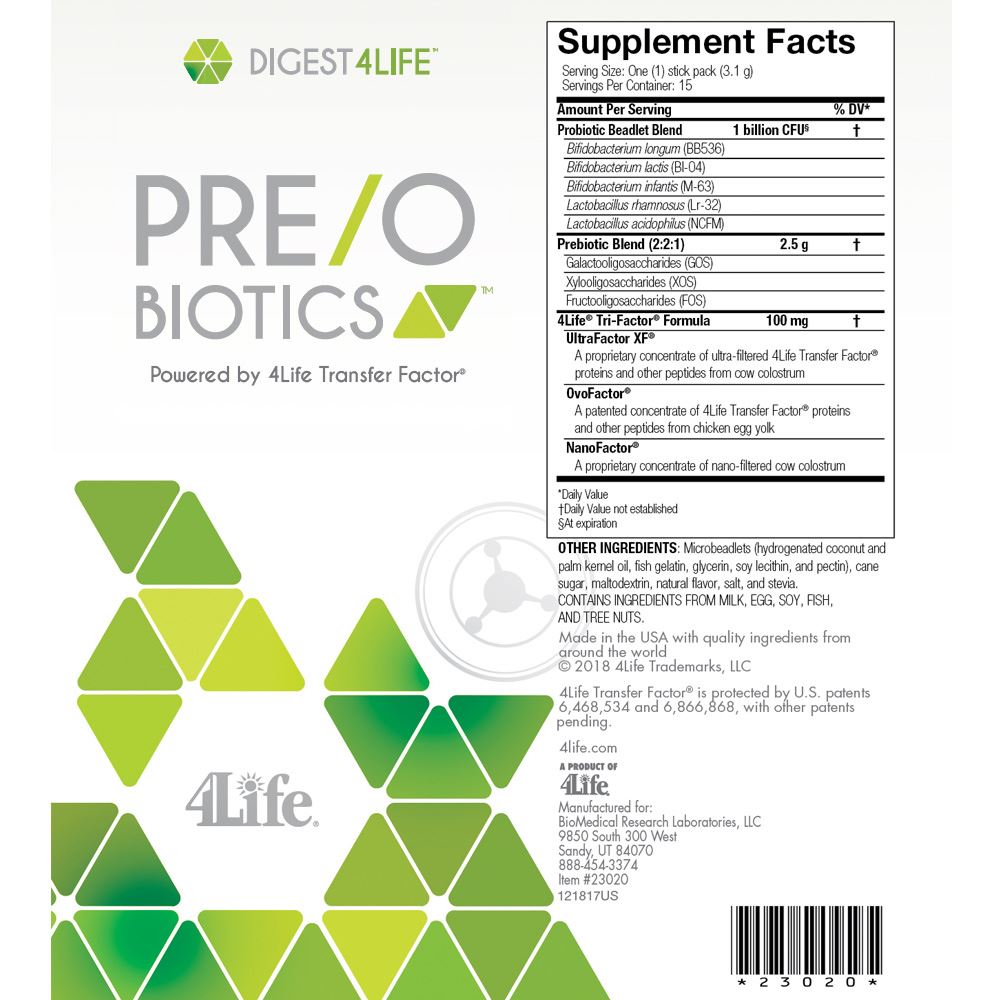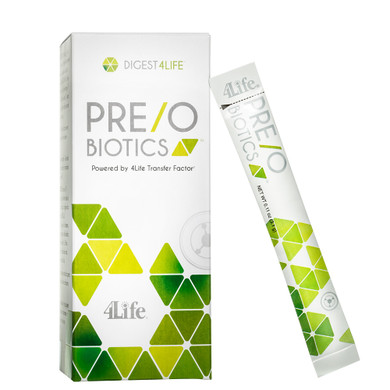.Pre/O Biotics Probiotics
-
Need Help? Call: 1-800-852-7700
-
FREE SHIPPING ALL ORDERS
Description
Pre/O Biotics
- • Optimizes healthy gut bacteria growth with our exclusive microbeadlet delivery*
- • Increases the amount and longevity of beneficial gut flora by up to 1000 times over standard delivery*
- • Supports healthy immune system function*
- • Is the only prebiotic/probiotic product in the world that’s powered by 4Life Transfer Factor®*
- • Requires no refrigeration

The Prebiotics You Need And Where To Find Them
There are two primary prebiotics that your body needs: inulin and oligofructose. There are also two sides to your colon, one side that prefers inulin (the left) and the other that prefers oligofructose (the right). These two prebiotics have been shown to provide maximum nourishment for your internal ecosystem. They help to multiply beneficial bacteria and combat gut dysbiosis, a bacterial imbalance in the gut that can result in indigestion, bloating, and other gastrointestinal symptoms.
Inulin is technically a long-chain prebiotic fiber that’s digested more slowly, while oligofructose is a short-chain prebiotic that’s digested more quickly. Any true, full-spectrum prebiotic supplement will contain both forms of prebiotic fiber, as well as fructooligosaccharides (FOS), galactooligosaccharides (GOS), and various other oligoosaccharides, all of which provide symbiotic nourishment in every area of your gut.
It’s important to note here that prebiotics are a form of soluble fiber as opposed to insolublefiber. Insoluble fiber is what most people refer to when they talk about “dietary fiber.” It’s basically an indigestible bulking substance that helps to “lubricate” the release of bound-up waste from the bowel.
Soluble fiber, on the other hand, is the prebiotic food that keeps probiotics nourished and happy − equally as important as insoluble fiber but in a different way.
Good Food Sources of Prebiotics
So which foods contain the highest levels of prebiotics? Most tuber (root) vegetables such as potatoes, yams, sweet potatoes, and cassava are naturally high in inulin, as are artichokes, asparagus, chicory root, bananas, dandelion root, garlic, agave, jicama, leeks, yacon, endives, dahlia, murnong, shallots, and onions. Wheat dextrin, psyllium husk, acacia gum, and whole grain wheat (just make sure it’s organic and glyphosate-free, if possible), are likewise rich in prebiotic fiber. And since many of these same foods also contain oligofructose, it’s easy to obtain both prebiotic forms simply by incorporating more of these foods into your regular diet.
If you’re getting enough prebiotics, you should notice benefits in the form of less bloating, better digestion, and improved regularity; healthy weight loss; a general feeling of “lightness” complimented by more energy; and sustained blood sugar levels.
By properly nourishing your gut microbiota you’ll also experience fewer infections, enhanced immune function, better nutrient absorption, helping you to feel better all-around. You can also get sustained relief from conditions like leaky gut syndrome and irritable bowel syndrome, both of which can result from gut dysbiosis stemming from inadequate prebiotic intake.
Incorporating more prebiotic-rich foods into your diet is an obvious no-brainer, and anyone with gut issues should absolutely do so as part of a diet-based corrective protocol to help improve digestion and immune function. You may also want to consider incorporating a full-spectrum prebiotic supplement into your diet to achieve optimal results, especially if the foods mentioned above aren’t a consistent part of your routine diet.
*The products and information found on www.transferfactor-4-life.com are not intended to replace professional medical advice or treatment. These statements have not been evaluated by the Food and Drug Administration. Our dietary supplements are not intended to diagnose, treat, cure or prevent any disease or medical condition. Individual results may vary. Transferfactor-4-life.com urges you to seek the advice of a qualified professional for any health concern lasting more than two weeks, and to share with your provider any information pertaining to your health and well-being, including the use of supplemental nutrition.

 Loading... Please wait...
Loading... Please wait...







